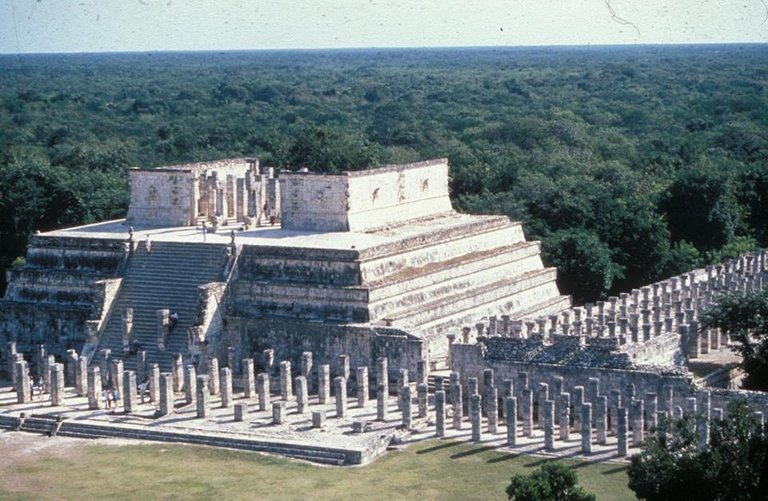CHICHEN (CHICCHAN) ITZA TEMPLE

The Mayan culture flourished in Mesoamerica during the early Christian era, before being completely wiped out by the Spanish conquest. Astronomy played a significant role in Mayan culture. Venus in particular had a preeminent status. Testimony to this rich tradition is borne out by Mayan temple art and the few available Codices, or sacred books, of the Mayans. Western scholars have attempted to relate the Mayan concepts to those of Greek astronomy. The sidereal Mayan astronomy is more akin to the Hindu system and does not easily fit into the Greek model.
Chichen Itza. This temple was built for astronomical purposes and during the vernal equinox (March 20) and the autumnal equinox (September 21) at about 3 P.M.. the sunlight bathes the western balustrade of the pyramid's main stairway. This causes seven isosceles triangles to form imitating the body of a serpent 37 yards long that creeps downwards until it joins the huge serpent's head carved in stone at the bottom of the stairway.
The serpent is of great significance in the Mayan culture also. A supreme example is the serpent of sunlight and shadow seen at Chichén Itzá. At the time of the equinoxes, as the Sun moves from east to west, a pattern of light and shadow appears on the west balustrade of the north stairway of the Castillo at Chichén Itzá. This display resembles a descending snake whose head is the monumental serpent head carved out of stone at the foot of the stairs. The feathered serpent represents the Mayan God Kukulcan, who is associated with rain water and new life, among other things. Kukulcan appears to be Sesa and Garuda combined into one.
Chicchan according to Mayan history is the serpent mind, the mind that is constantly renewed and regenerated, through a process of shedding what no longer serves us. The physical body itself can be seen as an evolutionary skin periodically released, as one life ends and another begins. It is a body fueled ultimately by a form of solar energy the Maya call kultunlilni. Kultunlilni is the vital life force empowering all human growth and development. This crucial life-force is the same as what is known in Hindu cosmology as the serpent power: kundalini. Kundalini is the great evolutionary force making of each body and its occupant, a potentially powerful source of solar wisdom. Important for us to remember, however, is that this primary, very intimate and very powerful source of wisdom is only accessible to the extent that we are able to hear what our bodies, as carriers of its sacred gift, are actually telling us. Inevitably in this process, we turn to those with whom we feel a strong attraction or affinity.
The Mayan temple is similar to the temple-pyramids of Cambodia, and is reminiscent of a prevalent concept in the Hindu-Buddhist world. It expresses the idea of erecting an artificial mountain, like the Indian Mount Sumeru, the Mountain ascending to Heaven.
It is said that Garuda represents the Vedas and the solar deities, and Shesa Naga represents the watery deities. The serpent is of great significance in the Mayan culture also.
A supreme example is the serpent of sunlight and shadow seen at Chichén Itzá. Kukulcan appears to be Shesa Naga and Garuda combined into one. The temple structure at the top is exactly 1/4th of the base according to Vastu Vedic principles of Mayan. Most interesting is the name of the structure - Chilambalam, meaning a sacred space. The Mayans worshiped the very concept of space, specifically a space made according to the modular system. This same idea is found in Hinduism in the sacred room in the center of the Chidambaram Siva Temple in South India, where space or akasha is worshiped-there is no idol. Mayan chilambalam refers to a sacred space, as does Tamil Chidambaram. Yok'hah in Mayan means "on top of truth," similar to yoga in Sanskrit.
Bakong at Angkorvat - Cambodia. Dedicated to Lord Shiva.
“Astronomically, it (Angkor Wat) has built-in positions for lunar and solar observation. The sun itself was so important to the builders of the temple that solar movement regulates the position of the bas-reliefs. It is not surprising that Angkor Wat integrates astronomy, the calendar, and religion since the priest-architects who constructed the temple conceived of all three as a unity. Astronomy was known as the sacred science."
“Transoceanic migrations to America have always been a favorite creed of those with the will to believe, but until quite recently anathema to all reputable American anthropologists.” - wrote John Alden Mason, author of The Ancient Civilizations of Peru.
The European conquerors of South and Central America not only destroyed practically all the records and literature of Asioamerica, but created an utterly distorted image of the American past by taking some of its ugly features out of context and magnifying them out of proportion. Human sacrifice practiced by the Aztecs was repeatedly stressed without explaining its extenuating features, and without pointing out that human sacrifice had not been unknown to other peoples, such as in Egypt, Rome and in the Bible. Taking their technique a step further they contrasted this picture with that of their own deeds in Asioamerica in which European misdemeanor, caprice, and criminality were soft-pedaled and civilized and humane behavior emphasized. Winged human figures whose hands are poised in gestures like Hindu/Buddhist mudras. Winged God from Candi Sukuh at Hindu Temple in Java, Indonesia.
Ek Balam - Built atop the base is Ek Balam’s massive main pyramid, reaching a height of 32 m and sporting a huge jaguar mouth with 360 degree dentition. Below the mouth are stucco skulls, while above and to the right sits an amazingly expressive figure. On the right side stand unusual winged human figures (some call them Maya angels), whose hands are poised in gestures looking for all the world like Hindu/Buddhist mudras.
Its enough to make you wonder about connections between ancient civilizations ……!